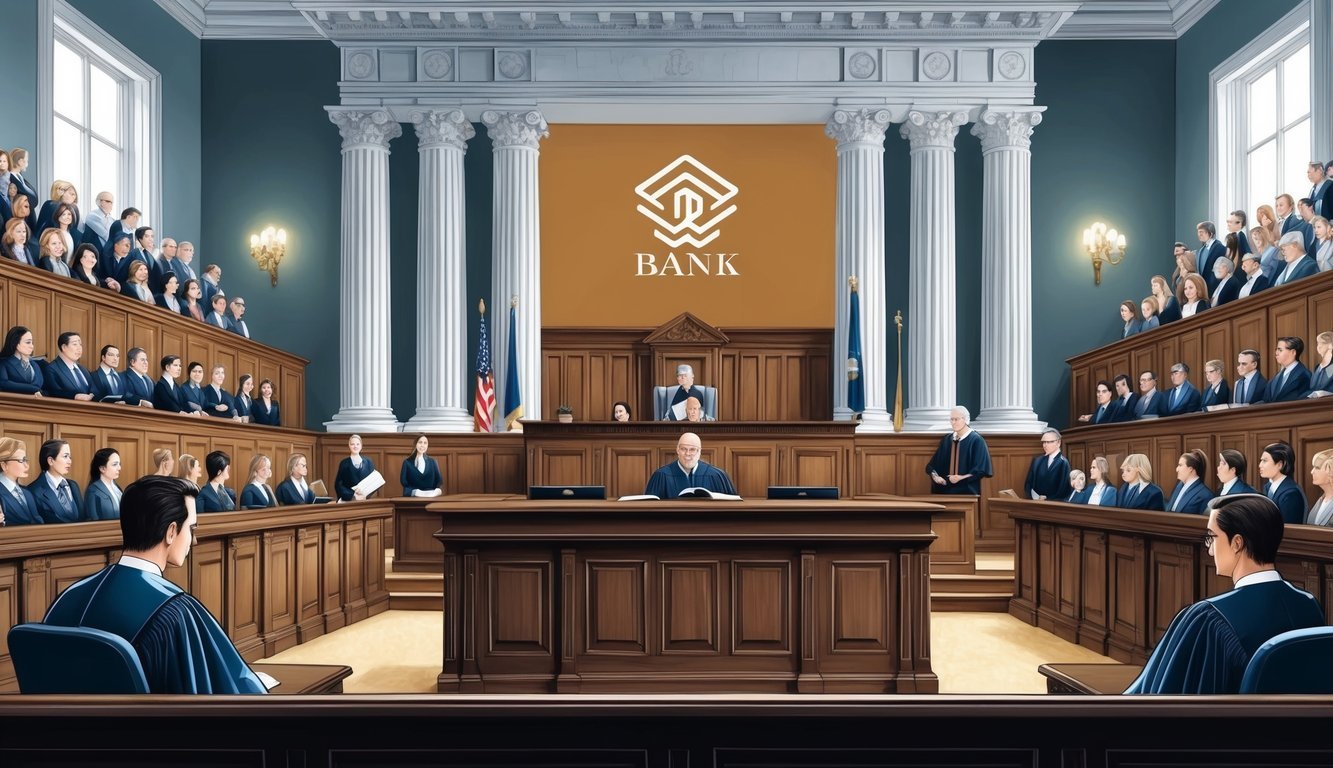When facing legal disputes with banks, finding the right attorney can make a crucial difference in the outcome of your case. New York, as a major financial hub, has numerous experienced lawyers specializing in banking litigation. These professionals possess the expertise to navigate complex financial laws and regulations.
Selecting the best lawyer to sue a bank requires careful consideration of their track record, expertise, and approach to your specific situation. You’ll want an attorney who understands the intricacies of banking law and has a proven history of successfully challenging financial institutions. Look for lawyers who specialize in areas such as lender liability, consumer finance defense, and banking litigation to ensure you have the strongest possible representation.
1) Attorney Richard Lefkowitz

If you’re looking for a skilled lawyer to sue a bank in New York, Richard Lefkowitz is a name worth considering. As a co-chair of the Real Estate Finance practice at Riemer & Braunstein LLP, he brings extensive experience to the table.
Rich represents numerous institutional clients, including balance sheet lending institutions and debt funds. His expertise spans a variety of real estate financing transactions and the resolution of problem loans on a national basis.
You’ll find that Rich’s background in banking and finance litigation could be particularly valuable when considering legal action against a bank. His deep understanding of the industry can provide you with unique insights and strategies.
As a member of his firm’s executive committee, Rich holds a position of leadership and influence. This role suggests a high level of trust in his abilities and judgment within the legal community.
When you’re facing a complex legal battle with a bank, you need an attorney who can navigate the intricacies of financial law. Rich’s experience in this area could prove invaluable to your case.
Remember that choosing the right attorney is crucial when taking on a financial institution. Rich’s credentials and specialized knowledge in real estate finance and problem loans make him a strong candidate for your consideration.
Understanding Legal Rights Against Banks
Banking regulations protect consumers and businesses from unfair practices. Knowing your rights is crucial when dealing with financial institutions.
Overview of Banking Regulations
The Consumer Financial Protection Bureau enforces federal laws governing banks. These laws cover areas like lending, account management, and debt collection.
Key regulations include the Truth in Lending Act and the Fair Credit Reporting Act. They ensure transparency in financial transactions and protect your credit information.
State laws also play a role. New York, for example, has strict usury laws limiting interest rates.
Banks must follow anti-discrimination laws when providing services. They cannot deny you an account or loan based on protected characteristics.
Common Legal Issues with Banks
Unauthorized charges are a frequent concern. You have the right to dispute these within 60 days of receiving your statement.
Unfair fees can be challenged. Banks must disclose all fees upfront and cannot change terms without notice.
Foreclosure is a serious issue. You have the right to be notified and explore alternatives before losing your home.
Debt collection practices are regulated. Banks cannot harass you or use deceptive tactics to collect debts.
Privacy breaches can lead to legal action. Banks must safeguard your personal and financial information.
If you face these issues, consider consulting a banking litigation attorney to protect your rights.
Criteria for Choosing the Best Lawyer
Selecting the right attorney to sue a bank requires careful consideration of several key factors. These criteria will help you identify a lawyer who can effectively handle your case against a financial institution.
Experience with Banking Law
Look for a lawyer with extensive experience in banking and finance law. You want someone who understands the complexities of financial regulations and has dealt with similar cases before. Banking litigation attorneys should have in-depth knowledge of federal and state banking laws.
Check the lawyer’s educational background and any specialized certifications in banking law. A strong grasp of financial products and services is crucial. Ask about their experience with specific types of banking disputes similar to yours.
Consider how long they’ve been practicing in this field. A lawyer with 10+ years of experience in banking litigation will likely have encountered a wide range of cases and developed effective strategies.
Track Record of Success
Evaluate the lawyer’s history of winning cases against banks. Look for concrete examples of successful outcomes in similar situations. Ask about their litigation success rates and any landmark cases they’ve handled.
Inquire about settlements they’ve negotiated and judgments they’ve won. A lawyer who has secured favorable outcomes for clients in banking disputes demonstrates their ability to navigate complex financial litigation.
Don’t hesitate to ask for specific details about past cases. How much compensation did they secure for clients? Have they dealt with your particular bank before?
Client Testimonials and Reviews
Seek out feedback from previous clients. Reputable lawyers often have testimonials on their websites or profiles. Look for reviews that specifically mention banking-related cases.
Check independent review sites and legal directories for unbiased opinions. Pay attention to comments about the lawyer’s communication style, responsiveness, and ability to explain complex legal concepts.
Consider reaching out to past clients directly, if possible. Ask about their experience working with the lawyer and whether they would recommend them for a banking lawsuit.
Look for patterns in the feedback. Consistent praise for a lawyer’s expertise and dedication is a good sign. Be wary of any recurring negative comments about professionalism or case management.
Preparing to Sue a Bank in New York
Suing a bank in New York requires careful preparation and understanding of the legal process. You’ll need to gather evidence, file a complaint, and navigate the complexities of the court system.
Gathering Evidence
Start by collecting all relevant documents related to your case. This may include bank statements, correspondence, contracts, and any other paperwork that supports your claim. Keep detailed records of all interactions with the bank, including dates, times, and names of individuals you spoke with.
Consider obtaining expert opinions if your case involves complex financial matters. Commercial litigation attorneys experienced in banking cases can help you identify and gather the most compelling evidence.
Create a timeline of events leading up to your decision to sue. This will help you and your legal team understand the full scope of the situation.
Filing a Complaint
Draft a clear and concise complaint outlining your grievances against the bank. Your complaint should include:
- The parties involved
- A description of the events leading to the lawsuit
- The legal basis for your claim
- The damages you’re seeking
File your complaint with the appropriate court. In New York, this may be a state or federal court, depending on the nature of your case.
Pay the required filing fees and ensure you follow all court rules and procedures. Your attorney can guide you through this process and ensure all deadlines are met.
Understanding the Legal Process
Familiarize yourself with the stages of a lawsuit:
- Discovery: Exchanging information with the bank’s legal team
- Motions: Requests made to the court before trial
- Settlement negotiations: Attempts to resolve the case out of court
- Trial: If a settlement isn’t reached
Be prepared for a potentially lengthy process. Banking litigation can be complex and time-consuming.
Stay actively involved in your case. Regularly communicate with your attorney and promptly respond to any requests for information or documentation.
Consider alternative dispute resolution methods like mediation or arbitration, which may be faster and less costly than a trial.
Frequently Asked Questions

Legal action against banks in New York requires understanding specific procedures, selecting qualified attorneys, and knowing your rights as a consumer. Proper preparation and expert guidance are crucial for a successful lawsuit.
What legal steps should be taken to file a lawsuit against a bank in New York?
To sue a bank in New York, you should first gather all relevant documentation related to your case. Consult with a banking and finance lawyer to evaluate the strength of your claim. File a complaint with the appropriate court, typically the New York Court of Claims for cases against state-chartered banks.
Who are specialized consumer protection attorneys for banking disputes in New York?
Richard Lefkowitz is a highly regarded banking attorney in New York. Other specialized lawyers can be found through legal directories or bar associations. Look for attorneys with experience in consumer protection and banking litigation.
What are the grounds on which a bank can be sued for negligence in the United States?
Banks can be sued for negligence if they fail to meet their duty of care to customers. Common grounds include unauthorized transactions, improper fund transfers, and breach of privacy. Predatory lending practices and violations of consumer protection laws are also valid reasons for legal action.
How can one recover funds that a bank has failed to return?
To recover funds, start by filing a formal complaint with the bank’s customer service department. If unsuccessful, escalate to the bank’s ombudsman or the Consumer Financial Protection Bureau. As a last resort, you may need to file a lawsuit to recover your funds.
What is the process for lodging a formal complaint against a financial institution in New York?
Begin by submitting a written complaint to the bank’s customer service department. If unresolved, file a complaint with the New York State Department of Financial Services. You can also contact the Consumer Financial Protection Bureau for federal-level assistance.
What credentials should be considered when selecting an attorney to sue a bank?
Look for attorneys with expertise in banking and finance law.
Consider their track record in similar cases and their standing with the New York State Bar Association.
Verify their experience in litigation against financial institutions and check client reviews or testimonials.

